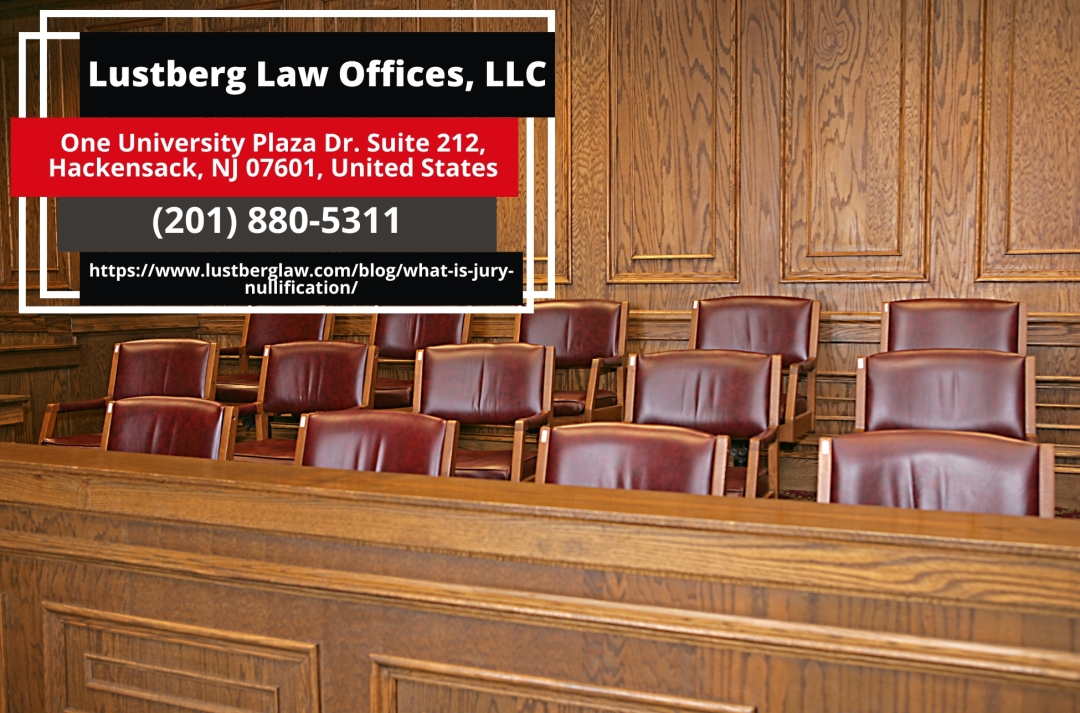New Jersey criminal defense attorney Adam M. Lustberg (https://www.lustberglaw.com/blog/what-is-jury-nullification/), of Lustberg Law Offices, LLC, has authored a comprehensive guide discussing the concept of jury nullification and its potential impact on criminal trials. In the article, Lustberg explores how jurors can influence case outcomes by delivering verdicts based on moral judgments rather than strict legal interpretations. This unique facet of the justice system, though rarely discussed openly, plays a significant role in shaping the outcomes of certain criminal cases.
Jury nullification occurs when a jury, despite acknowledging that the evidence supports a defendant's guilt, opts to acquit based on their belief that the law is unjust or unfairly applied. According to Adam M. Lustberg, this discretionary power allows jurors to act as a safeguard against rigid legal enforcement that may conflict with societal values. The article highlights how New Jersey criminal defense attorneys must navigate this complex legal matter to help ensure that defendants receive fair treatment under the law.
In the article, Lustberg underscores the distinction between traditional jury verdicts and jury nullification. The New Jersey criminal defense attorney explains that in a conventional trial, jurors are expected to render a verdict solely based on the evidence and legal instructions provided by the court. However, in cases of jury nullification, jurors step beyond the boundaries of evidence and law to consider broader issues such as fairness and justice. "Jury nullification represents a convergence of legal judgment and individual conscience," Lustberg notes, emphasizing the moral responsibilities that jurors carry.
Lustberg further examines the historical roots of jury nullification and its role as a check on governmental authority. Lustberg points out that while the practice is not formally sanctioned by New Jersey law, it remains an inherent right of jurors to deliver independent verdicts. The article highlights how jury nullification reflects the broader purpose of the jury system—to deliver justice not only within the confines of the law but also in accordance with community standards and values.
The article also addresses how New Jersey courts approach the topic. Lustberg explains that jury nullification is a contentious issue, and courts in the state generally discourage discussions about it during trials. In State v. Ragland, a landmark New Jersey Supreme Court case, the court described jury nullification as an "unfortunate but unavoidable power" that should be limited where possible. Despite this stance, jurors retain the ability to acquit defendants based on their own moral judgments, a power that criminal defense attorneys must remain aware of when crafting their trial strategies.
New Jersey criminal defense attorneys, according to Lustberg, must tread carefully when discussing jury nullification in courtrooms. While they may highlight the moral and societal implications of a case, directly encouraging jurors to nullify a law is considered improper and may lead to judicial reprimands or sanctions. Instead, attorneys focus on presenting arguments that subtly appeal to a jury’s sense of fairness and justice without explicitly referencing the concept.
The article explores the practical aspects of jury nullification, including when and why juries may choose to nullify a law. Lustberg cites examples such as cases involving minor drug offenses or acts of civil disobedience, where jurors might feel that a conviction would not serve the interests of justice. The New Jersey criminal defense attorney emphasizes that jury nullification tends to occur in situations where jurors believe that the law is overly punitive or outdated, or when they sympathize with the defendant’s circumstances.
Although jury nullification remains a controversial topic, Lustberg highlights its potential implications for defendants, prosecutors, and attorneys. For defendants, jury nullification offers the possibility of acquittal in cases where the law is deemed unjust. For prosecutors, it introduces an element of unpredictability in trial outcomes, even when the evidence appears strong. Attorneys, on the other hand, must balance their ethical obligations with the need to zealously advocate for their clients.
Lustberg advises that while jury nullification can be seen as a form of dissent against the legal system, it is not without consequences. The New Jersey criminal defense attorney warns that relying on it as a defense strategy introduces significant uncertainty into a case, as it depends on jurors independently choosing to act on their personal beliefs. Nonetheless, Lustberg argues that understanding this aspect of the legal process is essential for both jurors and attorneys.
Jury nullification remains a legal gray area in New Jersey. Courts discourage its use, but the power of jurors to exercise moral judgment in their verdicts is a critical part of the American legal system. Adam M. Lustberg’s article offers valuable insights into how this principle functions within New Jersey’s criminal justice system and how it may influence case outcomes.
About Lustberg Law Offices, LLC:
Lustberg Law Offices, LLC is a law firm based in New Jersey, providing dedicated legal defense services to clients facing criminal charges. Led by Adam M. Lustberg, the firm is committed to safeguarding clients' rights and helping ensure fair treatment under the law. With a focus on personalized legal strategies, Lustberg Law Offices, LLC can work tirelessly to pursue the best possible outcomes for every client.
Embeds:
Youtube Video: https://www.youtube.com/watch?v=UzYvMALyEAo
GMB: https://www.google.com/maps?cid=17248268094099978177
Email and website
Email: alustberg@lustberglaw.com
Website: https://www.lustberglaw.com/
Media Contact
Company Name: Lustberg Law Offices, LLC
Contact Person: Adam M. Lustberg
Email: Send Email
Phone: (201) 880-5311
Address:1 University Plaza Dr #212
City: Hackensack
State: New Jersey 07601
Country: United States
Website: https://www.lustberglaw.com/

